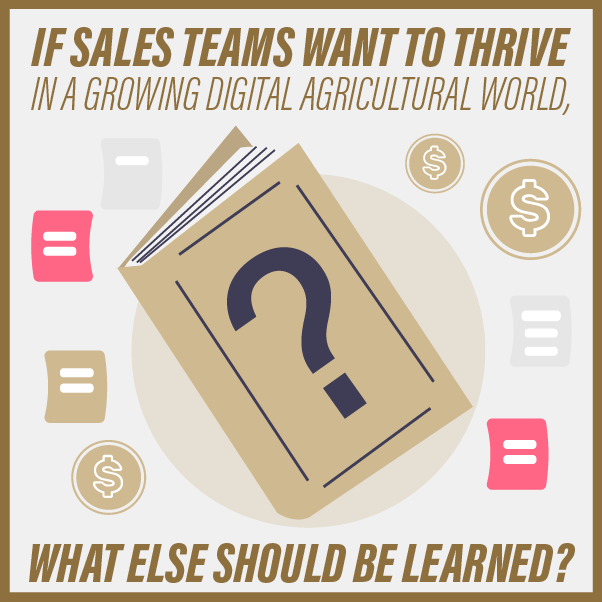Rev iewer
iewer
Dr. Luciano Castro, International Adjunct Professor
Article
How Sales Teams Can Thrive in a Digital World by Andris A. Zoltners, Prabhakant Sinha, and Sally E. Lorimer
Magazine
Harvard Business Review
Summary
This insightful article published by leading sales authors Zoltners, Sinha and Lorimer spoke on changes customers are going through and how sales organizations should adjust accordingly. This thought-provoking article suits the time the agribusiness industry is living in well with the surge of apps and online platforms happening at a high speed and the growing farmers’ adoption on the other side.
Although this article provides directions for companies in general to consider how to adjust their sales and channels strategy broadly, we always keep an eye on what changes of this type mean for agribusiness professionals here at the Center for Food and Agricultural Business. In this case, there are certain competencies salespeople must develop to thrive.
That said, this review builds upon the four recommendations given by the authors to suggest competencies (being either attitudes, skills or knowledge) salespeople must develop or strengthen in order for these recommendations to be effectively implemented by agribusinesses. After all, no matter what, people will always responsible for any change process. Additionally, this review discusses each recommendation and how it may relate to professional development for salespeople.
What this means for Food and Agricultural Business
The first recommendation revolves around leveraging the digital part of the sales offer. This means understanding how the digital part of a solution package can increase the value of what products and services are being sold. The authors note that, “Salespeople need to show the customer the path to value”, which is a great tip that can be related to what digital features may offer to customers through tracking information about them, the product efficacy, or general customer process efficacy or profitability.
To do this, agribusiness salespeople must expand their knowledge base to include an understanding of farmer customers’ business models, which is critical to be able to generate valuable insights for customers using technologies as enablers. This means knowledge cannot be limited to product knowledge such as seeds, crop protection or fertilizer. Instead, it must include farming processes such as planning, planting, harvesting, as well as the business side of the farm such as where value will be created and felt when the numbers related to buying, producing and selling are crunched and speak for themselves.
Understanding how value is created inside a farm is a prerequisite if a salesperson wants to develop insights for farmers on how to improve results. In other words, salespeople must be able to get the economics of their farmer customers and relate them to farming activities. Otherwise, salespeople may have a great amount of data and nice charts but might be incapable of extracting value from this analysis. Farmer customers need support to extract value from these digital tools.
The second recommendation the authors give deals with embracing digital natives as sellers and buyers. This means making sure companies increase the diversity of sales teams and include digital natives (who were born in this new digital world). This helps to facilitate the company’s process of connecting with younger or more progressive buyers, which are called Digital Native buyers.
Understanding where these younger farmers look for information and how they exchange information online with others will certainly facilitate how a company may adjust its media content and channels. Although the second recommendation of including digital natives into a sales team is a great tip, it is clear that, despite their age, all salespeople should be improving their fluency in the digital world. This includes things such as understanding the digital apps used by their company, the algorithms behind them and their features, social media platforms and how to use them professionally, how to create useful content and engage with interesting professional communities and more. There is a whole new digital world out there that salespeople need to embrace. For digital natives, this world comes easily/naturally, but older salespeople or ones with some reluctance must be willing to put in the extra effort. Certainly, digital technologies and digital marketing skills can be taught and included in trainings.
The third recommendation focuses on providing customers with multiple channels that resemble the customer journey behavior and touchpoints they expect to have, typically centered around traditional brick-and-mortar stores to online platforms. This recommendation revolves around the clear notion that consumers, in general, have become accustomed to the multichannel setting already and have explored multiple channels despite the will of any supplier. This means salespeople must prepare sales teams to perform their job in a multichannel setting. Therefore, there is a need for salespeople to understand the farmer customer journey from the early stage of the buying process to the after-purchase phase. Additionally, they must understand how different tools and channels may integrate and how their role will be integrated with other roles and tools. Educating sales teams on the farmer customer journey will facilitate the sales and marketing integration processes and reinforce the critical roles salespeople have in fulfilling the needs of customers at particular touchpoints.
Finally, the fourth recommendation revolves around using analytics to power sales decision processes. Salespeople can replace instinct and gut-feel decisions with more data-driven approaches, which means having more accurate processes for decisions based on prioritizing customers, selecting offers to pitch to customers, choosing demand generation activities based on previous outcomes, and more, for example. However, salespeople need to develop skills related to analytics and data-driven decision making in order to make this happen. Recently, a wide array of content has been deployed in this area, creating a need for salespeople to sharpen this competency, because, certainly, there is great applicability in the agribusiness industry.
In conclusion, I recommend the knowledge streams related to farmer customer business models, digital technologies and digital marketing, analytics and data-driven decision making and the farmer customer journey be strongly considered in salespeople development programs. These competencies can be covered at different depths and lengths according to the stage and needs of the company and salespeople roles. Previous bodies of knowledge such as sales techniques, general marketing, customer relationship management, negotiation, communication and others will remain important, but digital times will require additional competencies. This a good time to revisit the topics in which companies and sales professionals are investing their time and resources.



